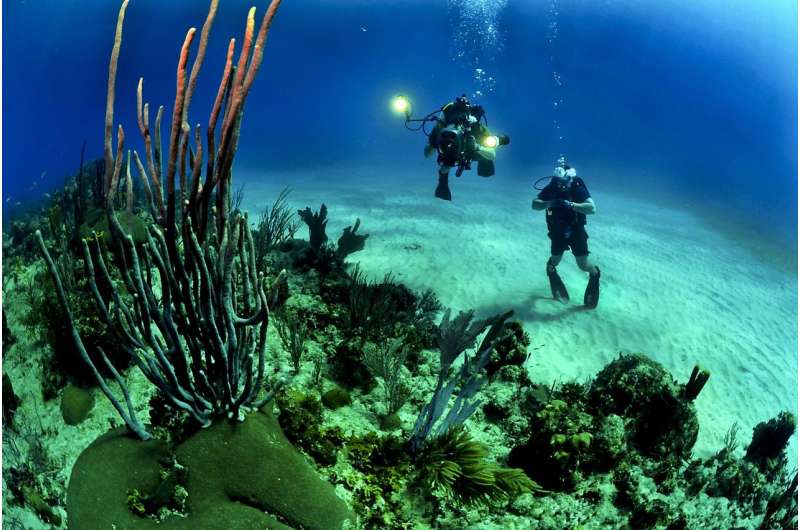
Coral reefs will continue to experience severe heat stress as rising temperatures cause the oceans to become unbearably hot—but a new study shows that altering their feeding habits could allow local populations to avoid total extinction.
Research into two species of coral native to Hawaii revealed that warmer waters caused by climate change play an important role in coral bleaching—a process that causes coral to lose their color—significantly disrupting coral health and growth. The effect that ocean acidification, a process that causes seawater to become more acidic due to the excess amount of carbon dioxide it has absorbed, has on heat-stressed coral was also investigated.
Over the last decade, there has been a rise in the incidence and severity of mass coral bleaching events around the globe, leading to increased mortality for these vital organisms.
However, this work suggests that some coral may well be resilient to these extreme environmental changes, said Kerri Dobson, lead author of the study who completed the work as a graduate student in earth sciences at the Ohio State University.
“Each coral species responds differently to stress and employs different methods to recover from that stress,” said Dobson, who currently teaches marine biology at the University of Southampton in the U.K. “Now we know that those responses depend on several factors.”
According to the study, which was recently published in Communications Earth & Environment, one of the most telling influences that can decide if coral might recover from a stressful event is its access to food.
Typically, corals feed by receiving nutrition provided by photosynthetic symbiotic algae and catching and eating tiny aquatic organisms called zooplankton. These algae also give coral their vibrant color, but when heat stressed, corals lose their algae, leaving them bleached white and starving.
In this work, researchers collected branch samples from bleached and non-bleached parent colonies following one large-scale heat-stress event in 2014 as well as a second, unexpected, heat-stress event in 2015. Once rehoused in special tanks, half of the corals were subjected to a different amount of food and simulated ocean acidification rates to see how these factors affected their potential recovery.
“This is one of the first studies, to our knowledge, that has been able to capture the impact of natural thermal stress on coral in two consecutive years,” Dobson said.

As a result of such unique long-term data, the team found that feeding coral zooplankton after a bleaching event could improve their overall resilience to warming temperatures, essentially minimizing mortality, promoting growth and enhancing coral recovery rates.
Ocean acidification did little to slow the corals’ recovery, suggesting that some corals could survive in more acidic waters. Unfortunately, this discovery also makes clear that the most present danger to coral reefs is heat stress, said Dobson.
“Heat stress affected the corals’ health much more than the simulated ocean acidification,” she said. “These heat-stress events function as selection forces, leaving only the more thermally tolerant coral that might be able to survive the stresses that we’re subjecting them to.”
Finally, the study’s findings emphasize the importance of understanding the conditions and evolutionary strategies that contribute to long-term coral survivorship, said Dobson. Moreover, this research offers a path for scientists and watch groups to better customize management and restoration efforts for coral reefs based on their species and location.
“This paper adds to our body of knowledge about coral resilience,” said Andrea Grottoli, senior author of the study and a professor in earth sciences at Ohio State. “It gives us more leverage in following up on evaluating how we can protect corals and manage bleaching events by manipulating the environment to their favor.”
While predictions about coral survivorship in the face of human-induced climate change do make room for hope concerning the fate of corals, these assumptions are based on the adherence to current climate mitigation goals, said Grottoli.
For example, it is possible that corals could adapt enough to survive a 2 degree Celsius increase in global temperatures. However, Earth’s current unmitigated acceleration to 4 degrees of warming by the end of the century could eradicate coral completely, she said.
As the next few decades are critical to determining the reality of these scenarios, Dobson’s future work will continue to investigate the impact of thermal stress on the ecology of coral reefs in other regions.
“When you do experiments with living animals in a natural setting, there’s always some degree of unpredictability, as we saw with the unexpected second heat-stress event we studied,” said Grottoli. “Ultimately, you have to roll with it because the work matters, and sometimes the things you didn’t plan to learn are the parts that are the most interesting.”
More information:
Kerri L. Dobson et al, Ocean acidification does not prolong recovery of coral holobionts from natural thermal stress in two consecutive years, Communications Earth & Environment (2024). DOI: 10.1038/s43247-024-01672-5
Provided by
The Ohio State University
Citation:
Feeding coral reefs can aid their recovery from bleaching events (2024, September 24)
retrieved 24 September 2024
from https://phys.org/news/2024-09-coral-reefs-aid-recovery-events.html
This document is subject to copyright. Apart from any fair dealing for the purpose of private study or research, no
part may be reproduced without the written permission. The content is provided for information purposes only.
